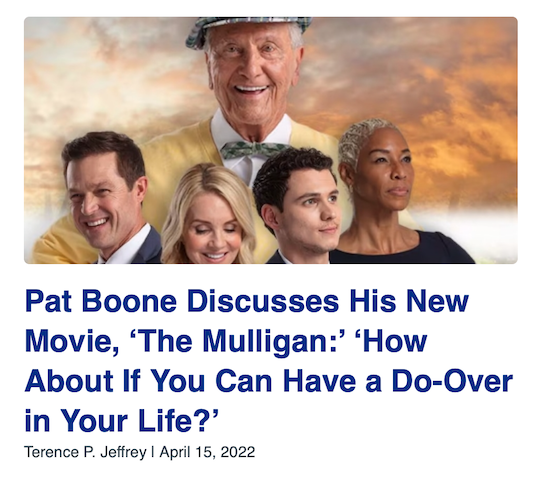In a March 7 CNSNews.com article, Craig Bannister complained that “At a White House event on Friday, Council of Economic Advisers chair Cecilia Rouse was thrown a softball question from a Washington Post reporter who declared that President Joe Biden isn’t getting enough credit for his accomplishments.” Needless to say, Bannister will never call out the softball questions lobbed by his boss, Terry Jeffrey, at his interview subjects. We’ve already noted the softballs Jeffrey has tossed to his own boss, Brent Bozell, and Reagan hagiographer Craig Shirley in interviews more designed to promote their books than offer any insight into their authors.
But those aren’t the only people Jeffrey has been fluffing lately in his interview series (which actually has a decidedly lame name, “Online With Terry Jeffrey”). An April 15 article detailed his interview with Pat Boone, who has a new religious-themed film out. Jeffrey began by reciting Boone’s resume — “Over the course of his career, Boone has sold 45 million records and starred in 15 movies” — and his first question was about … the golf course where the movie is set. There were many more golf-related questions. There was nothing about Boone’s vicious hatred for Barack Obama that was so virulent that it undermined his nice-guy image.
That was followed by an April 19 interview with biased anti-Biden reporter Miranda Devine, who wrote a book about her obsession with Hunter Biden’s laptop. Much of the interview is Jeffrey prompting Devine to recite her anti-Biden talking points and refusing to challenge her on them. Devine was the reporter who worked with Republican operatives to push the October surprise of Hunter Biden’s laptop before the 2020 election. But rather than question her about why she made no effort before the election to provide unimpeachable evidence of the laptop’s veracity — which would have kept the story from being dismissed as Russian disinformation by most observers — Jeffrey simply teed her up to complain that the story was dismissed.
The goal of these interviews — aside from the promotional value for the interviewees — is to portray Jeffrey as a serious journalist. But he’s not, and the fluffiness of these interviews further undermines that claim.
